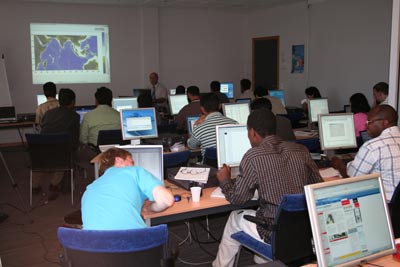The Training Academy Concept
Rationale
One of the conclusions of ODINAFRICA-III has been that it is impossible to avoid staff turnover. Staff turn-over will occur for several reasons: (i) staff decide to leave the institution because they have found a job offering better financial rewards or decided to pursue further studies (in fact the capacity development opportunities provided by IOC/IODE may make staff more attractive to other employers); (ii) staff have been promoted within the government to another government department (also this may be an indirect result of our capacity development activities); (iii) staff may have left for health reasons or passed away (this happened in a few cases).

The impact on the NODC (National Oceanographic Data Centre) or Marine Library of staff trained by the project but leaving the institution can be dramatic, as we can generally invite only one participant from each country when organizing a regional course. Even during the ODINAFRICA-III project, which lasted for 4 years, we had to organize courses for countries that had lost staff. In addition, new countries were added that also needed start-up training.
In addition, the continuing calls for establishing ODINs in other regions mean that the same courses need to be organized regularly. We also note that increasingly we receive requests from member states requesting participation, at their own cost, in our courses (even though no specific publicity is made for the courses).
Given the above, it was therefore concluded that there was a need for a regular cycle of standardized courses that are relevant for all regions. This constitutes a standard curriculum of courses that can be organized annually.
Objectives
The Objective of the OceanTeacher Training Academy was to establish a facility that would provide an annual teaching programme of courses related to oceanographic data and information management and the development of related products and services that contributed to the sustainable management of oceans and coastal areas in Africa and other regions. The OceanTeacher Training Academy underpinned all Ocean Data and Information Networks developed by IOC/IODE. The OceanTeacher Academy furthermore promoted the development of regional training nodes, thereby providing a multiplier effect on the number of trainees as well as a contribution to the long-term sustained impact of the provided capacity-building activities of IOC/IODE and other IOC programmes.
The Training Academy contributed to:
- Building high-quality and up-to-date expertise in oceanographic data and information management and exchange in new national oceanographic data centres (NODCs) and related facilities;
- Keeping staff in existing national oceanographic data centres (NODCs), marine information centres and related facilities up-to-date with the latest methodological and technical developents (continuous professional development);
- Creating awareness for the importance of oceanographic data management and marine information management with university students (marine environmental studies) to ensure that they will contribute quality data to data centres during their future career;
- Creating awareness for the importance of oceanographic data management with experts in oceanography and related disciplines.
The above objectives were first addressed to Africa as a matter of priority and to other regions as far as possible.
Target trainees
The courses targeted the following trainees:
- staff of newly established national oceanographic data centres and related facilities;

- staff of well-established national oceanographic data centres and related facilities;
- staff of newly established marine libraries and information centres;
- staff of well established marine libraries and information centres;
- university students who need familiarization with oceanographic data management and exchange;
- staff of facilities working in other but related disciplines (eg meteorologists, operational oceanographers, oceanography researchers, coastal planners,…) who need familiarization with oceanographic data management and exchange.
At the moment IODE already cooperates with several universities and programs, of which students attend training courses in oceanographic data management at the Project Office in Ostend: ECOMAMA, MARELAC, STIMULATE. Further collaboration will be sought with universities, both in Belgium and abroad.
In all cases, prospective trainees must have academic credentials in marine science (for data management), librarianship (for marine information management) or in a closely allied discipline. Trainees from closely allied disciplines must have either classroom experience or work experience with marine datasets.
Development of a university student awareness course
There is a strong need to develop a university student awareness course in OceanTeacher, aimed at providing university students (Master programme, PhD) with the necessary background to manage their research data and to produce basic data products (maps, graphs) for their own research projects (eg Master or PhD dissertation).
University students should then be able to address the following questions:
- Where to find relevant oceanographic data for their own research project?
- How to manage their own research data?
- How to produce basic data products (maps, charts) for their own research project? (eg a sea surface temperature chart)
There is currently one short-course in Oceanographic Data Management available for university students.
A specific university course (or courses) will be further developed in the next phase of OceanTeacher. These courses will then be provided at several universities (preferably both in Belgium and outside Europe). Efforts will be made to promote the use of OceanTeacher by marine science students at universities.
Accreditation
It should be noted that the training provided is technical training, not academic. As such the courses will be short-term (1-4 weeks) and will result in the issuing of Certificates.
Course types
The following course types will be offered:
- Basic Courses – Survey courses of fundamental principles in data or information management. These courses assume current familiarity with marine data and information, but provide the first instance of definitions and working principles that have not been developed in previous undergraduate/graduate education.
- Advanced Courses -- Courses beyond the survey level that tackle complex topics beyond the basic concepts. In data management, for example, these courses would examine relationships between data publication, their formats, and methods to analyze them within the provided software packages.
- Applied Courses – Courses that directly tackle very specialized treatment of specific data types, or data for specific applications. Examples of these courses would be a workshop to create and quality control a sea level data management system for a particular site, or a workshop to create and publish an online web mapping system for a part of the world ocean.
- Accredited (University) Courses – Courses, sometimes very similar to the above, developed specifically to meet formal university course requirements of coordinating institutions.
- Continuing Professional Development (CPD) Courses – Courses designed to provide professional information and data managers with updated information, new information, or re-fresher information on selected topics of interest. Typically, these courses include former trainees or fully qualified professionals who seek expanded familiarity with “hot topics”.
OceanTeacher, since 2009, is also used by:
- the Nippon Foundation-POGO Centre of Excellence in Observational Oceanography (CofE) (Bermuda)
- the Erasmus Mundus MSC in Marine Biodiversity and Conservation (University of Gent, Belgium).
The OceanTeacher Academy project (2009-2013) is supported financially by the Government of Flanders through FUST. The contribution by the Government of Flanders is US$ 1,540,000; the counterpart contribution by UNESCO/IOC is US$ 153,000.